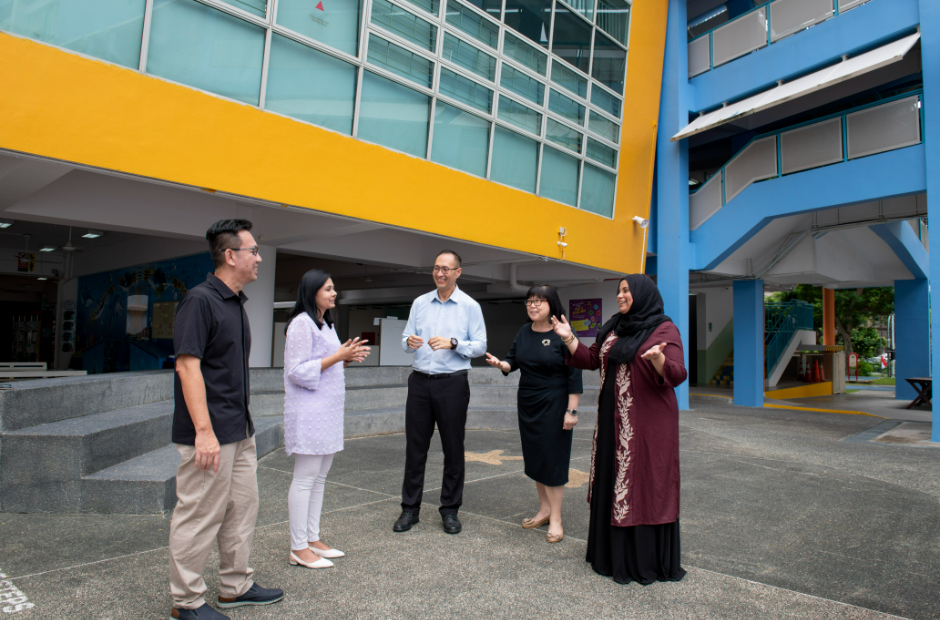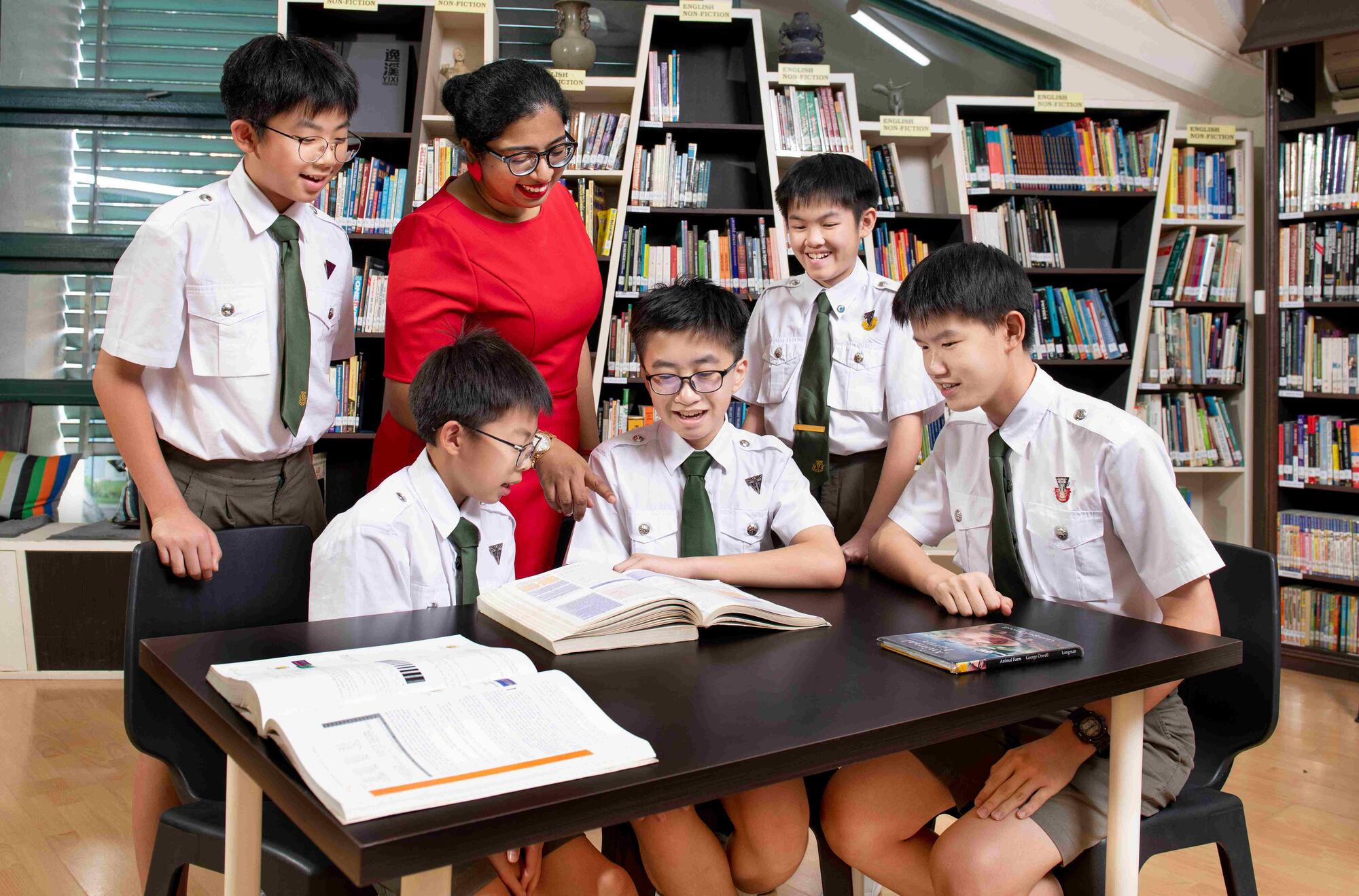Watching the students in Mr Daniel Chua’s class huddle around pieces of cake and hearing the squeals of joy, you’d think they were celebrating a birthday.
That’s what Maths lessons sound like in Mr Chua’s class. In this particular lesson, the students were having fun trying to cut cake into portions based on the fractions they were given.
“I wanted to show the kids that they actually use these concepts in real life,” says the Chongzheng Primary School Mathematics and Science teacher. “At the end of the day, the most important thing for me is the child’s curiosity. When you ignite their curiosity, and they want to find out more, or see how to bring the lesson to another part of their lives — that is where I feel teaching is successful.”
Mr Chua benchmarks his teaching ideas against his own experiences as a student, when he didn’t find school interesting, not even when he chose to pursue engineering at a polytechnic.
“So now, every time a child comes into my class, I will try to make this class his or her happiest place in school,” he says. “I hope no student will go through what I went through. There should not be another young Daniel who studies for the sake of passing examinations, but one who can see connections to life beyond the classroom in what he learns, and experience joy when learning.”
Holding tight to these sentiments, he strives to make lessons interesting and relatable. He seems to have nailed it from the get-go: At the very first school he taught at, his students voted him their Most Innovative Teacher for two years in a row.
Visit the Antarctic? Slay dragons? Game on!
What’s the art behind his interesting lessons in Maths and Science? Since he started teaching 15 years ago, Mr Chua has made gamification a key part of his teaching techniques.
His students have pretended to be explorers travelling to places like the Sahara or Antarctica to learn more about adaptive animal behaviour. Others were tasked with solving maths problems to defeat evil dragons.
Lessons change with each cohort as Mr Chua is a big believer in “not doing the same thing twice”. To maintain this level of innovation, he draws inspiration from books he reads and games that are trending with kids.
“Every time a child comes into my class, I will try to make this class his or her happiest place in school.”
Mr Daniel Chua
Recently, seeing as how Pokemon Go games were such a hit among his students, he designed a Maths lesson where they could create the hero character Ash and battle monsters like Lieutenant Surge’s Raichu by solving Maths problems and earning gym badges.
“If you can reconstruct the lesson in the students’ language, it will sync up with them,” he shares, his voice bubbling with excitement.
Equally important to Mr Chua is staying abreast of the latest best practices and tools. In the beginning, he would use handcrafted props and board games in class, but with advances in technology, he has adopted the use of tools like Google Documents and QR Codes to create more elaborate gameplay.
In 2020, he tapped on his SkillsFuture credits to take a course on micro:bit so he could better incorporate elements of STEM into his teaching. And in 2021, he took a year’s break from teaching to read for a Master’s in Education (Educational Assessment), to allow himself to explore ways to test a student’s understanding of a subject without a formal exam.
Mr Chua’s most important tip for designing a meaningful lesson? “Before you plan a lesson, you need to know your students,” he advises. And by that, he isn’t referring to their academic ability but their personalities and preferred learning styles.
For his students who were more the kinaesthetic and visual learning types, he designed a circuit for them to run around in, so they could mimic how oxygen and digested food travel through the bloodstream. Another time, he gave each of them a terrarium to take care of so they could observe the water cycle.
If there were students in his class who liked to draw or tell stories, he’d give them the choice of drawing a comic or writing a story to explain a concept he was teaching. This was a win-win: Students had fun and he could be a better judge of how well each of them understood the material.

Less telling, more guiding of his students and colleagues
With Mr Chua’s emphasis on fun and games, it may be surprising to some that he is also the Prefect Master and the Head of Department for Student Management (a.k.a Discipline Master of the school). He sees a common goal in all his roles, which is to help students find meaning in what they do.
When managing his prefects, innovation means creating opportunities for them to learn about leadership. To do this, he allows them autonomy to plan school-wide events. He also created a journal to guide them as they reflect on their experiences.
When students misbehave, he takes a restorative stance rather than an authoritative one. He walks them through a series of questions like “what did you do?” and “what were you thinking when you did that?”, not to accuse but to help students reflect on their behaviour.
“The most powerful of all is when we ask them ‘What can you do to fix this?’, because it puts the decision-making back in their hands,” Mr Chua explains.
He has shared across schools about his use of the Restorative Practice approach, and runs gamification clinics for his colleagues. Some ask for feedback after implementing his ideas, but just as Mr Chua gently guides his students, he does the same for his colleagues – he encourages them to find their “own right answer”.
It goes back to his conviction that self-belief — that sense of intrinsic motivation and personal standards — matters more in living a meaningful life.
“I prefer that they know the expectation they have set for themselves, and decide for themselves if they have achieved it.”






